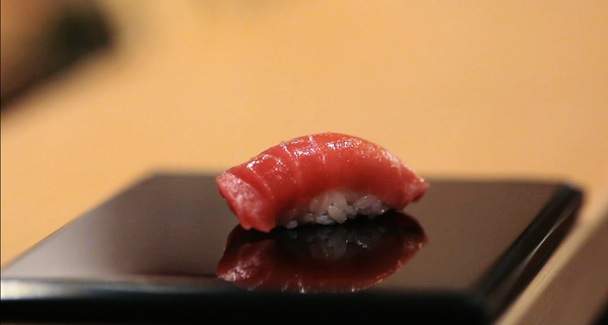Jiro Dreams of Sushi
A slick and tasty morsel but this feature is no main meal.
Overview
Jiro Dreams of Sushi, a hagiographic portrait of 85-year-old sushi master and three-Michelin Star restauranteur Jiro Ono, could and should have been a short film. If you just clicked that link and watched the trailer for this film, then you've basically seen the film.
We know straight up that Jiro is a perfectionist and a workaholic and yet the film wastes valuable time declaring its subject's mythic status in the Japanese culinary scene and confines 80 percent of the action within his hidden-away 10-seater restaurant, Sukiyabashi Jiro.
Shot using the latest-and-greatest RED Cam, the texture of the film has all the trappings of a very slick commercial. It's overladen with a slew of heavy-handed cinematic conceits, such as super slow motion, shallow depth of field photography, and more than its share of time-lapse montage sequences set to an incredibly self-important and hackneyed iteration of a Philip Glass score.
At one point, and this just exactly encapsulates the tone of the film, we hear a naff food writer say, "every mouthful of Jiro's sushi is like eating his philosophy" and see a glistening piece of soy sauce-slicked blue fin tuna land on a porcelain plate with just the right amount of bounce-on-impact-captured-in-extreme-close-up to make doe-eyed popcorn-guzzling viewers stop mid-mouthful turn to their buddy and spit, "wow, that's really fresh tuna."
Portraits of obsessive people are most interesting when they offer insights into the life of the subject outside of his or her specialty area. I wanted to see how Ono deals with the chaos of the world beyond the borders of his hallowed restaurant where he isn't a reigning deity. The film does give a rudimentary backstory, but it doesn't go nearly far enough fleshing it out. Are there any unrealised wishes in Ono's life? Secret diversions? Regrets? If you find an occupation you love and spend your entire life working at it, is that enough?
To have positioned Ono at the centre of modern-day Japan would have given this film some much-needed weight and context. That is, how does the working culture of Sukiyabashi Jiro illuminate a broader cultural tendency? Alas, this is a very lazy debut by director David Gelb.
https://youtube.com/watch?v=hbV6knbeUFE





